 The Health Sciences and Human Services Library Historical Collections’ strives to provide broad access to our diverse collections both in person and digitally. Materials in our collections appear as they originally were published or created and may contain offensive or inappropriate language or images and may be offensive to users. The University of Maryland, Baltimore does not endorse the views expressed in these materials. Materials should be viewed in the context in which they were created.
The Health Sciences and Human Services Library Historical Collections’ strives to provide broad access to our diverse collections both in person and digitally. Materials in our collections appear as they originally were published or created and may contain offensive or inappropriate language or images and may be offensive to users. The University of Maryland, Baltimore does not endorse the views expressed in these materials. Materials should be viewed in the context in which they were created.
First Women of the University of Maryland, Baltimore
In March 2020, before UMB entered into mandatory telework due to the COVID-19 Pandemic, the HSHSL installed an exhibit called First Women of the University of Maryland, Baltimore. As the title suggests, the exhibit highlighted the first women—first graduates, deans, etc.—of UMB. Unfortunately, the exhibit was installed a mere two weeks before the library shut down and was taken down before the library reopened in the fall; therefore, few people had the opportunity to view the exhibit. This blog post recreates the exhibit’s literature and photographs; the complete exhibit is available in our digital archive.
Introduction – Panel One
“There were some people who felt this was no place for a woman, that you were taking a man’s place and that a woman would not devote her life to medicine as a man would. It was frustrating to hear but, ‘I belong here’ was always my answer.” ~Dr. Bella F. Schimmel, UMSOM Class of 1952
Reflection of Dr. Schimmel on her time as a medical student for the Fall 2018 article, “Empowered to Practice: Maryland Celebrates 100 Years of Admitting Women,” in the University of Maryland Medicine Bulletin. Vol. 103, No. 2
While the quote refers directly to the struggles of woman students in the School of Medicine, the sentiments were often faced by woman in each of the professional schools as students, faculty, or administration. Women at the University of Maryland, Baltimore often fought their way to a diploma, professorship or deanship, struggling to gain admittance, fair treatment, and equal footing in a man’s world. This exhibit celebrates and honors the firsts: The first woman graduates, first woman faculty members, first woman deans, in other words, the ones that ‘belonged here’ as the first woman leaders at UMB. In their honor and on their shoulders we celebrate Women’s History Month.
Dr. Emilie Foeking, DDS – Panel Two
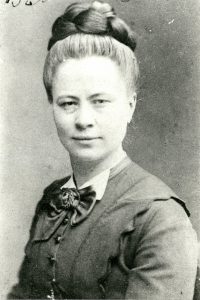 Dr. Emilie Foeking was the first woman to graduate from the Baltimore College of Dental Surgery in February 1873. Dr. Foeking was from Danzig, Prussia; she entered the United States to receive a dental education after being refused one in her home country. Dr. Foeking was rejected by the Pennsylvania College of Dental Surgery and with the help of Dr. James Trumen and Dean Ferdinand J.S. Gorgas entered the Baltimore College of Dental Surgery. She was the first woman to receive a degree in any medical field at the University of Maryland or its predecessors and in Maryland. Her thesis, “Is Woman Adapted to the Dental Profession?” was published in April 1973 in the American Journal of Dental Sciences. Following graduation she returned to Europe and practiced dentistry in Germany.
Dr. Emilie Foeking was the first woman to graduate from the Baltimore College of Dental Surgery in February 1873. Dr. Foeking was from Danzig, Prussia; she entered the United States to receive a dental education after being refused one in her home country. Dr. Foeking was rejected by the Pennsylvania College of Dental Surgery and with the help of Dr. James Trumen and Dean Ferdinand J.S. Gorgas entered the Baltimore College of Dental Surgery. She was the first woman to receive a degree in any medical field at the University of Maryland or its predecessors and in Maryland. Her thesis, “Is Woman Adapted to the Dental Profession?” was published in April 1973 in the American Journal of Dental Sciences. Following graduation she returned to Europe and practiced dentistry in Germany.
Louisa Parsons – Panel Three
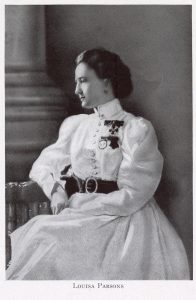 Louisa Parsons was the first Superintendent of the University Hospital Training School for Nurses, a predecessor of the School of Nursing. The School opened under Parsons’ leadership in December 1889. In April 1889, Parsons came to Baltimore as second in command to Isabel Hampton at Johns Hopkins’ Nurses training school, a job she held for six months after which she came to the University Hospital Training School for Nurses. As superintendent, she oversaw the two-year nursing curriculum, introduced the “Flossie” nursing cap, and opened nursing quarters for the students. Parsons served as superintendent until 1892 when she left Baltimore to pursue other nursing positions. At the time of her death in 1916, Parsons had served as a nurse in three wars, two military expeditions, and other volunteer health organizations and received five medals of honor for her work. She was an 1880 graduate of the [Florence] Nightingale Training School for Nurses at the St. Thomas Hospital in London. In 1922, the Louisa Parsons Home for Nurses opened on West Lombard Street in honor of her leadership.
Louisa Parsons was the first Superintendent of the University Hospital Training School for Nurses, a predecessor of the School of Nursing. The School opened under Parsons’ leadership in December 1889. In April 1889, Parsons came to Baltimore as second in command to Isabel Hampton at Johns Hopkins’ Nurses training school, a job she held for six months after which she came to the University Hospital Training School for Nurses. As superintendent, she oversaw the two-year nursing curriculum, introduced the “Flossie” nursing cap, and opened nursing quarters for the students. Parsons served as superintendent until 1892 when she left Baltimore to pursue other nursing positions. At the time of her death in 1916, Parsons had served as a nurse in three wars, two military expeditions, and other volunteer health organizations and received five medals of honor for her work. She was an 1880 graduate of the [Florence] Nightingale Training School for Nurses at the St. Thomas Hospital in London. In 1922, the Louisa Parsons Home for Nurses opened on West Lombard Street in honor of her leadership.
Dr. Lady Mary Johnson, MD – Panel Four
Lady Mary Johnson graduated from the Maryland College of Pharmacy, a predecessor of the School of Pharmacy, in 1898, becoming the first woman graduate. Dr. Johnson graduated from the Woman’s Medical College of Baltimore in 1897 and entered the MCP as a senior student that year. After graduation, Dr. Johnson married Dr. James J. Durrett, University of Maryland School of Medicine, Class of 1897. The Drs. Durrett moved to West Virginia. After passing her medical exam in that state—receiving the highest score of all candidates—she practiced medicine along with her husband in Fairmont, WV. Dr. Johnson died in Boulder, CO in 1927.
Ruth Lee Briscoe, MLS – Panel Five
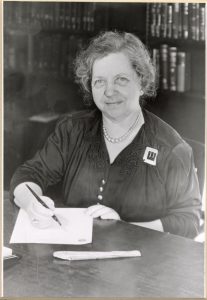 After the sudden death of Dr. Eugene F. Cordell, the first librarian at the University of Maryland, Ruth Lee Briscoe was hired to replace him. Joining the University in 1914, she was the first professionally trained librarian; she oversaw the Medical Library for the entirety of her career but also served intermittently as librarian for the Law, Pharmacy, Dentistry, and Commerce schools. Briscoe was well liked by students, faculty, administration, and staff; she grew the library collections and opened the materials up for student and faculty use. As the collections expanded and student enrollment grew, she oversaw several renovations of the library. Briscoe retired in 1946 and was named Medical Librarian Emeritus in honor of her accomplishments and service to the University. Briscoe passed away in 1955.
After the sudden death of Dr. Eugene F. Cordell, the first librarian at the University of Maryland, Ruth Lee Briscoe was hired to replace him. Joining the University in 1914, she was the first professionally trained librarian; she oversaw the Medical Library for the entirety of her career but also served intermittently as librarian for the Law, Pharmacy, Dentistry, and Commerce schools. Briscoe was well liked by students, faculty, administration, and staff; she grew the library collections and opened the materials up for student and faculty use. As the collections expanded and student enrollment grew, she oversaw several renovations of the library. Briscoe retired in 1946 and was named Medical Librarian Emeritus in honor of her accomplishments and service to the University. Briscoe passed away in 1955.
Dr. B. Olive Cole, Pharm.D., J.D. – Panel Six
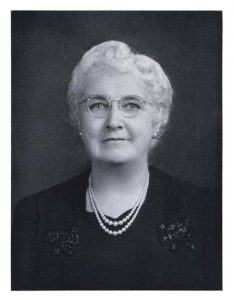 Known as the “First Lady of Maryland Pharmacy”, Dr. B. Olive Cole was a force in the University of Maryland community. Dr. Cole’s distinguished accomplishments included becoming one of the first women graduates of the School of Pharmacy in 1913, one of the first woman awarded a law degree from the University of Maryland School of Law in 1923, the first woman to hold a full professorship at the School of Pharmacy and the first woman appointed to Acting Dean of the School of Pharmacy in 1948. It is believed that she may have been the first woman to hold a full professorship at any school of pharmacy in the United States. She initially gained interest in pharmaceuticals as a stenographer for a prominent Baltimore drug manufacturer – an interest that led to earning the degree of Doctor of Pharmacy. Though she never practiced law officially, she made pharmacy law her specialty after earning her law degree.
Known as the “First Lady of Maryland Pharmacy”, Dr. B. Olive Cole was a force in the University of Maryland community. Dr. Cole’s distinguished accomplishments included becoming one of the first women graduates of the School of Pharmacy in 1913, one of the first woman awarded a law degree from the University of Maryland School of Law in 1923, the first woman to hold a full professorship at the School of Pharmacy and the first woman appointed to Acting Dean of the School of Pharmacy in 1948. It is believed that she may have been the first woman to hold a full professorship at any school of pharmacy in the United States. She initially gained interest in pharmaceuticals as a stenographer for a prominent Baltimore drug manufacturer – an interest that led to earning the degree of Doctor of Pharmacy. Though she never practiced law officially, she made pharmacy law her specialty after earning her law degree.
In 1953, Dr. B. Olive Cole retired at the age of 70 and was named professor emeritus of the School of Pharmacy after 33 years of service. Dr. Cole passed away in 1971. She was posthumously inducted into the Maryland Woman’s Hall of Fame in 2005.
Dr. Theresa “Tessie” Ora Snaith, MD – Panel Seven
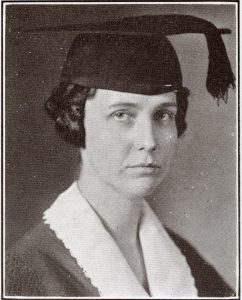 The University of Maryland School of Medicine opened its doors to women in 1918; five years later the first woman graduate, Dr. Theresa Ora Snaith, received her medical degree. She was one of two women in the class of 1923 but the only one to graduate that year. The 1923 Terra Mariae yearbook editor remembered by saying, “I am sure we all agree that she has not detracted from the prestige of our Alma Mater.” A far cry from extolling the accomplishments of the first woman graduate. Following graduation, Dr. Snaith completed her residency at the University Hospital in Baltimore and later returned to her hometown of Weston, West Virginia to set up private practice. In Weston, she was the first woman physician and was well-respected, liked, and remembered in the small town. Dr. Snaith passed away in 1961 from leukemia.
The University of Maryland School of Medicine opened its doors to women in 1918; five years later the first woman graduate, Dr. Theresa Ora Snaith, received her medical degree. She was one of two women in the class of 1923 but the only one to graduate that year. The 1923 Terra Mariae yearbook editor remembered by saying, “I am sure we all agree that she has not detracted from the prestige of our Alma Mater.” A far cry from extolling the accomplishments of the first woman graduate. Following graduation, Dr. Snaith completed her residency at the University Hospital in Baltimore and later returned to her hometown of Weston, West Virginia to set up private practice. In Weston, she was the first woman physician and was well-respected, liked, and remembered in the small town. Dr. Snaith passed away in 1961 from leukemia.
Esther Elizabeth McCready, RN, MA – Panel Eight
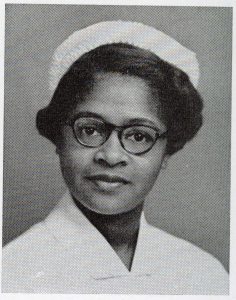 In 1950, Esther Elizabeth McCready became the first black woman admitted to the University of Maryland School of Nursing. After being denied admission to the University in 1949, McCready sued on the grounds of discrimination. She lost her first case but, being determined to attend UMAB, McCready enlisted the help of the NAACP and Thurgood Marshall, who was just a young attorney at the time. They appealed her case and over a year later, the initial ruling was overturned because she was fully qualified regardless of her race – paving the way for other African Americans at the University of Maryland. After graduating in 1953, Esther McCready began an impressive nursing career spanning many years in both Maryland and New York. In addition to her success as a nurse, McCready earned a master’s degree from the Manhattan School of Music. As a trained opera singer, she travelled the world performing and teaching voice. One of her most notable students was Raven Symone. In 2004, Esther Elizabeth McCready was inducted into the Maryland Women’s Hall of Fame.
In 1950, Esther Elizabeth McCready became the first black woman admitted to the University of Maryland School of Nursing. After being denied admission to the University in 1949, McCready sued on the grounds of discrimination. She lost her first case but, being determined to attend UMAB, McCready enlisted the help of the NAACP and Thurgood Marshall, who was just a young attorney at the time. They appealed her case and over a year later, the initial ruling was overturned because she was fully qualified regardless of her race – paving the way for other African Americans at the University of Maryland. After graduating in 1953, Esther McCready began an impressive nursing career spanning many years in both Maryland and New York. In addition to her success as a nurse, McCready earned a master’s degree from the Manhattan School of Music. As a trained opera singer, she travelled the world performing and teaching voice. One of her most notable students was Raven Symone. In 2004, Esther Elizabeth McCready was inducted into the Maryland Women’s Hall of Fame.
Dr. Ruth H. Young, DSW – Panel Nine
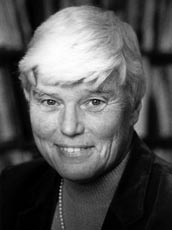 Dr. Ruth H. Young joined the faculty of the School of Social work soon after its founding in 1964. She was a graduate of Wellesley College and Catholic University of America and had served in the Navy’s Women Accepted for Volunteer Emergency Service (WAVES) before joining the faculty at the University of Maryland, Baltimore (UMB). During her 24 years of service at UMB she served as acting dean twice, once 1965 and again in 1976; founded an undergraduate social work program at the University of Maryland Baltimore County; and served as acting Vice President of Academic Affairs for the University of Maryland, College Park. Additionally, Dr. Young was named the first woman dean of the School of Social work in 1977. During her deanship, she promoted inter-professional education and worked hard to integrate the School of Social Work with the other professional schools in Baltimore. Dr. Young passed away in 2009, the Ruth H. Young Center on UMB’s campus is named in her honor.
Dr. Ruth H. Young joined the faculty of the School of Social work soon after its founding in 1964. She was a graduate of Wellesley College and Catholic University of America and had served in the Navy’s Women Accepted for Volunteer Emergency Service (WAVES) before joining the faculty at the University of Maryland, Baltimore (UMB). During her 24 years of service at UMB she served as acting dean twice, once 1965 and again in 1976; founded an undergraduate social work program at the University of Maryland Baltimore County; and served as acting Vice President of Academic Affairs for the University of Maryland, College Park. Additionally, Dr. Young was named the first woman dean of the School of Social work in 1977. During her deanship, she promoted inter-professional education and worked hard to integrate the School of Social Work with the other professional schools in Baltimore. Dr. Young passed away in 2009, the Ruth H. Young Center on UMB’s campus is named in her honor.
Dr. Barbara C. Hansen, Ph.D. – Panel Ten
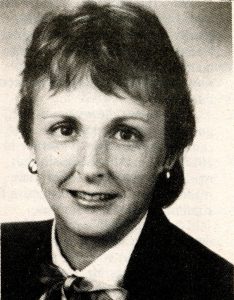 Barbara C. Hansen was named the first Vice Chancellor for Graduate Studies and Research soon after the merger of the University of Maryland, Baltimore and University of Maryland, Baltimore County graduate programs in 1985. In this role, Hansen reported to the chancellors at both schools; during her five-year tenure she grew enrollment and external funding in the graduate programs. In 1990 Dr. Hansen became director of the Obesity and Diabetes Research Center at UMB, a position that fit her research in obesity and diabetes. Hansen was a graduate of the University of California, Los Angeles and the University of Washington, Seattle and was a professor of Physiology at UMB’s School of Medicine. Dr. Hansen left the University of Maryland in 2005 for the University of South Florida.
Barbara C. Hansen was named the first Vice Chancellor for Graduate Studies and Research soon after the merger of the University of Maryland, Baltimore and University of Maryland, Baltimore County graduate programs in 1985. In this role, Hansen reported to the chancellors at both schools; during her five-year tenure she grew enrollment and external funding in the graduate programs. In 1990 Dr. Hansen became director of the Obesity and Diabetes Research Center at UMB, a position that fit her research in obesity and diabetes. Hansen was a graduate of the University of California, Los Angeles and the University of Washington, Seattle and was a professor of Physiology at UMB’s School of Medicine. Dr. Hansen left the University of Maryland in 2005 for the University of South Florida.
Alice Cary, MS – Panel Eleven
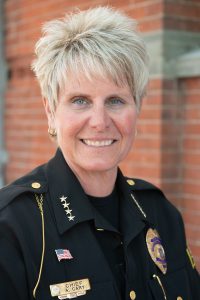 Chief Alice Cary joined the University of Maryland, Baltimore Police Department in June 2018 becoming the first woman police chief in the department’s 70-year history. Chief Cary started her career in Flint, Michigan and came to UMB from the University of Oregon. In Cary’s time at UMB, she has introduced new initiatives including police comfort dogs and the Community Outreach and Support Team (COAST), which received a Governor’s Award for Outstanding Proactive Crime Prevention in December 2019.
Chief Alice Cary joined the University of Maryland, Baltimore Police Department in June 2018 becoming the first woman police chief in the department’s 70-year history. Chief Cary started her career in Flint, Michigan and came to UMB from the University of Oregon. In Cary’s time at UMB, she has introduced new initiatives including police comfort dogs and the Community Outreach and Support Team (COAST), which received a Governor’s Award for Outstanding Proactive Crime Prevention in December 2019.
Women at the University of Maryland, Baltimore Today
“In times past woman has been relegated to the rear; indeed, it has been thought that her duties were confined to household work, even to handling the kettles and pans, but now woman has come forward and has begun the battle of ‘survival of the fittest.’ She has not acquired this position by her winning ways or her pretty face, but has won her position by her intellect.” ~Reverend Jere Knode Cooke
Address at Maryland College of Pharmacy Commencement, 1898
This quote is just as relevant today as it was 122 years ago. Because of the struggles and successes of the University of Maryland, Baltimore’s first women featured here the University has come a long way in its 213-year history. Today, women students at UMB outnumber their male counterparts. Woman faculty members are chairing departments, attaining full professorship, and leading their schools as deans as well as managing impactful research studies. Finally, we have for the first time a woman police chief. Woman, as the quote suggests, are accomplishing great feats at UMB through their talent and intellect.
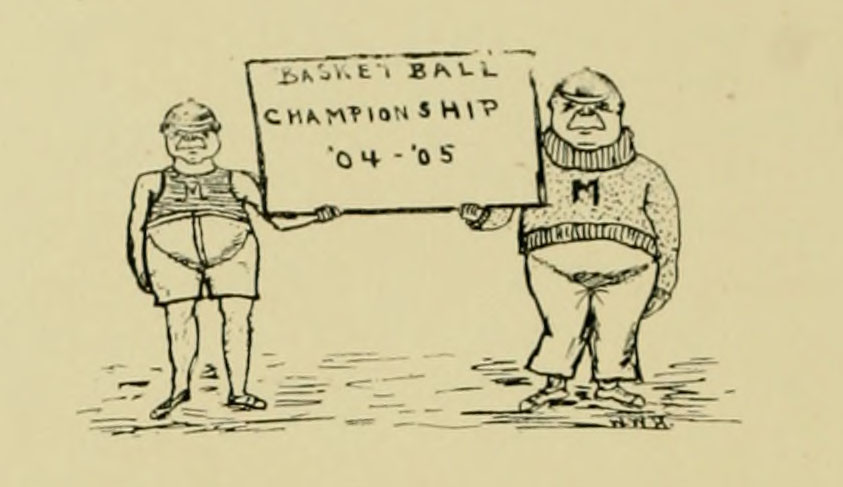 It is the end of March, which means March Madness and the NCAA men’s basketball tournament is in full swing! The first NCAA tournament occurred in 1939 with eight teams competing for the championship. The first time a University of Maryland team appeared in the tournament was 1958. The 1958 team was composed of players from the University of Maryland, College Park. The University of Maryland, Baltimore has never had a basketball team in the NCAA tournament; however, UMB has produced a championship Basketball team.
It is the end of March, which means March Madness and the NCAA men’s basketball tournament is in full swing! The first NCAA tournament occurred in 1939 with eight teams competing for the championship. The first time a University of Maryland team appeared in the tournament was 1958. The 1958 team was composed of players from the University of Maryland, College Park. The University of Maryland, Baltimore has never had a basketball team in the NCAA tournament; however, UMB has produced a championship Basketball team.  In the fall of 1904, the University of Maryland, Baltimore formed it’s first Basketball team to compete in the inaugural season of the Southern Intercollegiate Basket Ball League. The league failed but the UMB basketball team flourished. The team was managed by Roscoe C. Carnal and captained by William W. Hala, both from the School of Medicine Class of 1905. Other players included Henry Blank, William Landon Brent, and Samuel Luther Bare, School of Medicine Class of 1905; Paul B.H. Smith, School of Medicine Class of 1906; Harry Young Righton, School of Medicine Class of 1907; H.L. Thompson, School of Dentistry Class of 1907; William James F. Barton and John Clarence Allen, School of Dentistry Class of 1905; and J. Knox Insley, School of Medicine Class of 1908.
In the fall of 1904, the University of Maryland, Baltimore formed it’s first Basketball team to compete in the inaugural season of the Southern Intercollegiate Basket Ball League. The league failed but the UMB basketball team flourished. The team was managed by Roscoe C. Carnal and captained by William W. Hala, both from the School of Medicine Class of 1905. Other players included Henry Blank, William Landon Brent, and Samuel Luther Bare, School of Medicine Class of 1905; Paul B.H. Smith, School of Medicine Class of 1906; Harry Young Righton, School of Medicine Class of 1907; H.L. Thompson, School of Dentistry Class of 1907; William James F. Barton and John Clarence Allen, School of Dentistry Class of 1905; and J. Knox Insley, School of Medicine Class of 1908.  After the failure of the Intercollegiate League, an agreement was made with the Johns Hopkins University Basketball team to play a series of three games for a Maryland State Championship. The first game was played January 21, 1905 at Hopkin’s court with the home team winning 20 to 8. According to the 1905 Terra Mariae yearbook the University of Maryland team suffered from a lack of understanding of the new rules of play.
After the failure of the Intercollegiate League, an agreement was made with the Johns Hopkins University Basketball team to play a series of three games for a Maryland State Championship. The first game was played January 21, 1905 at Hopkin’s court with the home team winning 20 to 8. According to the 1905 Terra Mariae yearbook the University of Maryland team suffered from a lack of understanding of the new rules of play. 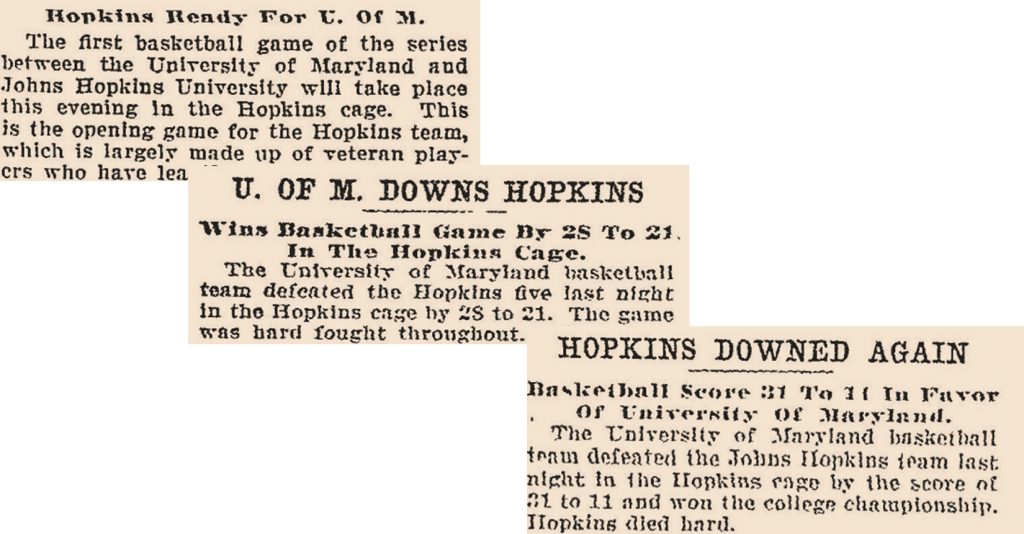 The second game in the Maryland State Championship series versus Hopkins was played February 22, 1905. In this game the University of Maryland team prevailed by a score of 28 to 21 setting the stage for the third and final meeting. On March 2, 1905, the final game was played. With a score of 31 to 11, UMB took the State Championship in its first year of existence!
The second game in the Maryland State Championship series versus Hopkins was played February 22, 1905. In this game the University of Maryland team prevailed by a score of 28 to 21 setting the stage for the third and final meeting. On March 2, 1905, the final game was played. With a score of 31 to 11, UMB took the State Championship in its first year of existence!

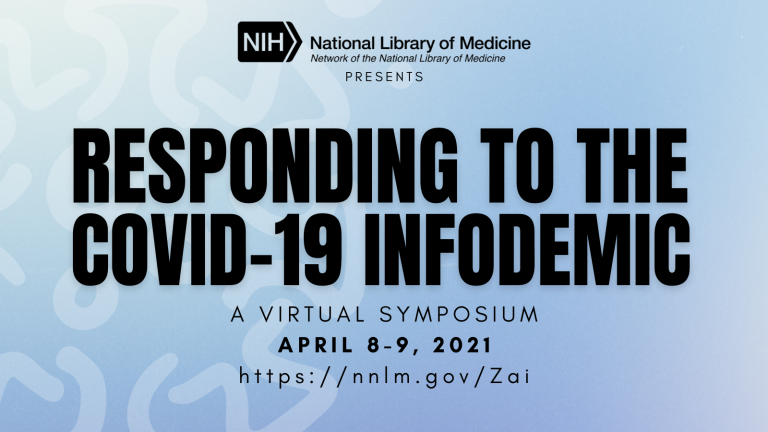
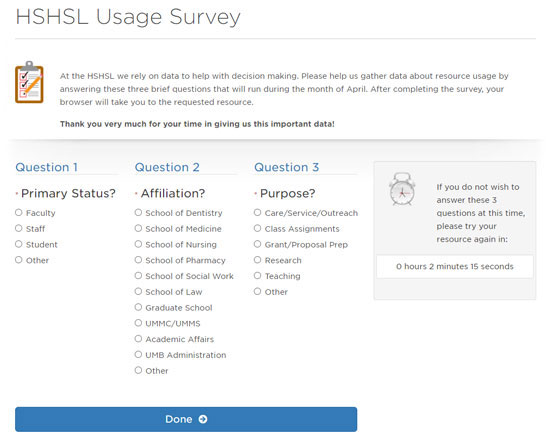
 The Health Sciences and Human Services Library Historical Collections’ strives to provide broad access to our diverse collections both in person and digitally. Materials in our collections appear as they originally were published or created and may contain offensive or inappropriate language or images and may be offensive to users. The University of Maryland, Baltimore does not endorse the views expressed in these materials. Materials should be viewed in the context in which they were created.
The Health Sciences and Human Services Library Historical Collections’ strives to provide broad access to our diverse collections both in person and digitally. Materials in our collections appear as they originally were published or created and may contain offensive or inappropriate language or images and may be offensive to users. The University of Maryland, Baltimore does not endorse the views expressed in these materials. Materials should be viewed in the context in which they were created. Dr. Emilie Foeking was the first woman to graduate from the Baltimore College of Dental Surgery in February 1873. Dr. Foeking was from Danzig, Prussia; she entered the United States to receive a dental education after being refused one in her home country. Dr. Foeking was rejected by the Pennsylvania College of Dental Surgery and with the help of Dr. James Trumen and Dean Ferdinand J.S. Gorgas entered the Baltimore College of Dental Surgery. She was the first woman to receive a degree in any medical field at the University of Maryland or its predecessors and in Maryland. Her thesis, “Is Woman Adapted to the Dental Profession?” was published in April 1973 in the American Journal of Dental Sciences. Following graduation she returned to Europe and practiced dentistry in Germany.
Dr. Emilie Foeking was the first woman to graduate from the Baltimore College of Dental Surgery in February 1873. Dr. Foeking was from Danzig, Prussia; she entered the United States to receive a dental education after being refused one in her home country. Dr. Foeking was rejected by the Pennsylvania College of Dental Surgery and with the help of Dr. James Trumen and Dean Ferdinand J.S. Gorgas entered the Baltimore College of Dental Surgery. She was the first woman to receive a degree in any medical field at the University of Maryland or its predecessors and in Maryland. Her thesis, “Is Woman Adapted to the Dental Profession?” was published in April 1973 in the American Journal of Dental Sciences. Following graduation she returned to Europe and practiced dentistry in Germany. Louisa Parsons was the first Superintendent of the University Hospital Training School for Nurses, a predecessor of the School of Nursing. The School opened under Parsons’ leadership in December 1889. In April 1889, Parsons came to Baltimore as second in command to Isabel Hampton at Johns Hopkins’ Nurses training school, a job she held for six months after which she came to the University Hospital Training School for Nurses. As superintendent, she oversaw the two-year nursing curriculum, introduced the “Flossie” nursing cap, and opened nursing quarters for the students. Parsons served as superintendent until 1892 when she left Baltimore to pursue other nursing positions. At the time of her death in 1916, Parsons had served as a nurse in three wars, two military expeditions, and other volunteer health organizations and received five medals of honor for her work. She was an 1880 graduate of the [Florence] Nightingale Training School for Nurses at the St. Thomas Hospital in London. In 1922, the Louisa Parsons Home for Nurses opened on West Lombard Street in honor of her leadership.
Louisa Parsons was the first Superintendent of the University Hospital Training School for Nurses, a predecessor of the School of Nursing. The School opened under Parsons’ leadership in December 1889. In April 1889, Parsons came to Baltimore as second in command to Isabel Hampton at Johns Hopkins’ Nurses training school, a job she held for six months after which she came to the University Hospital Training School for Nurses. As superintendent, she oversaw the two-year nursing curriculum, introduced the “Flossie” nursing cap, and opened nursing quarters for the students. Parsons served as superintendent until 1892 when she left Baltimore to pursue other nursing positions. At the time of her death in 1916, Parsons had served as a nurse in three wars, two military expeditions, and other volunteer health organizations and received five medals of honor for her work. She was an 1880 graduate of the [Florence] Nightingale Training School for Nurses at the St. Thomas Hospital in London. In 1922, the Louisa Parsons Home for Nurses opened on West Lombard Street in honor of her leadership. After the sudden death of Dr. Eugene F. Cordell, the first librarian at the University of Maryland, Ruth Lee Briscoe was hired to replace him. Joining the University in 1914, she was the first professionally trained librarian; she oversaw the Medical Library for the entirety of her career but also served intermittently as librarian for the Law, Pharmacy, Dentistry, and Commerce schools. Briscoe was well liked by students, faculty, administration, and staff; she grew the library collections and opened the materials up for student and faculty use. As the collections expanded and student enrollment grew, she oversaw several renovations of the library. Briscoe retired in 1946 and was named Medical Librarian Emeritus in honor of her accomplishments and service to the University. Briscoe passed away in 1955.
After the sudden death of Dr. Eugene F. Cordell, the first librarian at the University of Maryland, Ruth Lee Briscoe was hired to replace him. Joining the University in 1914, she was the first professionally trained librarian; she oversaw the Medical Library for the entirety of her career but also served intermittently as librarian for the Law, Pharmacy, Dentistry, and Commerce schools. Briscoe was well liked by students, faculty, administration, and staff; she grew the library collections and opened the materials up for student and faculty use. As the collections expanded and student enrollment grew, she oversaw several renovations of the library. Briscoe retired in 1946 and was named Medical Librarian Emeritus in honor of her accomplishments and service to the University. Briscoe passed away in 1955. Known as the “First Lady of Maryland Pharmacy”, Dr. B. Olive Cole was a force in the University of Maryland community. Dr. Cole’s distinguished accomplishments included becoming one of the first women graduates of the School of Pharmacy in 1913, one of the first woman awarded a law degree from the University of Maryland School of Law in 1923, the first woman to hold a full professorship at the School of Pharmacy and the first woman appointed to Acting Dean of the School of Pharmacy in 1948. It is believed that she may have been the first woman to hold a full professorship at any school of pharmacy in the United States. She initially gained interest in pharmaceuticals as a stenographer for a prominent Baltimore drug manufacturer – an interest that led to earning the degree of Doctor of Pharmacy. Though she never practiced law officially, she made pharmacy law her specialty after earning her law degree.
Known as the “First Lady of Maryland Pharmacy”, Dr. B. Olive Cole was a force in the University of Maryland community. Dr. Cole’s distinguished accomplishments included becoming one of the first women graduates of the School of Pharmacy in 1913, one of the first woman awarded a law degree from the University of Maryland School of Law in 1923, the first woman to hold a full professorship at the School of Pharmacy and the first woman appointed to Acting Dean of the School of Pharmacy in 1948. It is believed that she may have been the first woman to hold a full professorship at any school of pharmacy in the United States. She initially gained interest in pharmaceuticals as a stenographer for a prominent Baltimore drug manufacturer – an interest that led to earning the degree of Doctor of Pharmacy. Though she never practiced law officially, she made pharmacy law her specialty after earning her law degree. The University of Maryland School of Medicine opened its doors to women in 1918; five years later the first woman graduate, Dr. Theresa Ora Snaith, received her medical degree. She was one of two women in the class of 1923 but the only one to graduate that year. The 1923 Terra Mariae yearbook editor remembered by saying, “I am sure we all agree that she has not detracted from the prestige of our Alma Mater.” A far cry from extolling the accomplishments of the first woman graduate. Following graduation, Dr. Snaith completed her residency at the University Hospital in Baltimore and later returned to her hometown of Weston, West Virginia to set up private practice. In Weston, she was the first woman physician and was well-respected, liked, and remembered in the small town. Dr. Snaith passed away in 1961 from leukemia.
The University of Maryland School of Medicine opened its doors to women in 1918; five years later the first woman graduate, Dr. Theresa Ora Snaith, received her medical degree. She was one of two women in the class of 1923 but the only one to graduate that year. The 1923 Terra Mariae yearbook editor remembered by saying, “I am sure we all agree that she has not detracted from the prestige of our Alma Mater.” A far cry from extolling the accomplishments of the first woman graduate. Following graduation, Dr. Snaith completed her residency at the University Hospital in Baltimore and later returned to her hometown of Weston, West Virginia to set up private practice. In Weston, she was the first woman physician and was well-respected, liked, and remembered in the small town. Dr. Snaith passed away in 1961 from leukemia. In 1950, Esther Elizabeth McCready became the first black woman admitted to the University of Maryland School of Nursing. After being denied admission to the University in 1949, McCready sued on the grounds of discrimination. She lost her first case but, being determined to attend UMAB, McCready enlisted the help of the NAACP and Thurgood Marshall, who was just a young attorney at the time. They appealed her case and over a year later, the initial ruling was overturned because she was fully qualified regardless of her race – paving the way for other African Americans at the University of Maryland. After graduating in 1953, Esther McCready began an impressive nursing career spanning many years in both Maryland and New York. In addition to her success as a nurse, McCready earned a master’s degree from the Manhattan School of Music. As a trained opera singer, she travelled the world performing and teaching voice. One of her most notable students was Raven Symone. In 2004, Esther Elizabeth McCready was inducted into the Maryland Women’s Hall of Fame.
In 1950, Esther Elizabeth McCready became the first black woman admitted to the University of Maryland School of Nursing. After being denied admission to the University in 1949, McCready sued on the grounds of discrimination. She lost her first case but, being determined to attend UMAB, McCready enlisted the help of the NAACP and Thurgood Marshall, who was just a young attorney at the time. They appealed her case and over a year later, the initial ruling was overturned because she was fully qualified regardless of her race – paving the way for other African Americans at the University of Maryland. After graduating in 1953, Esther McCready began an impressive nursing career spanning many years in both Maryland and New York. In addition to her success as a nurse, McCready earned a master’s degree from the Manhattan School of Music. As a trained opera singer, she travelled the world performing and teaching voice. One of her most notable students was Raven Symone. In 2004, Esther Elizabeth McCready was inducted into the Maryland Women’s Hall of Fame. Dr. Ruth H. Young joined the faculty of the School of Social work soon after its founding in 1964. She was a graduate of Wellesley College and Catholic University of America and had served in the Navy’s Women Accepted for Volunteer Emergency Service (WAVES) before joining the faculty at the University of Maryland, Baltimore (UMB). During her 24 years of service at UMB she served as acting dean twice, once 1965 and again in 1976; founded an undergraduate social work program at the University of Maryland Baltimore County; and served as acting Vice President of Academic Affairs for the University of Maryland, College Park. Additionally, Dr. Young was named the first woman dean of the School of Social work in 1977. During her deanship, she promoted inter-professional education and worked hard to integrate the School of Social Work with the other professional schools in Baltimore. Dr. Young passed away in 2009, the Ruth H. Young Center on UMB’s campus is named in her honor.
Dr. Ruth H. Young joined the faculty of the School of Social work soon after its founding in 1964. She was a graduate of Wellesley College and Catholic University of America and had served in the Navy’s Women Accepted for Volunteer Emergency Service (WAVES) before joining the faculty at the University of Maryland, Baltimore (UMB). During her 24 years of service at UMB she served as acting dean twice, once 1965 and again in 1976; founded an undergraduate social work program at the University of Maryland Baltimore County; and served as acting Vice President of Academic Affairs for the University of Maryland, College Park. Additionally, Dr. Young was named the first woman dean of the School of Social work in 1977. During her deanship, she promoted inter-professional education and worked hard to integrate the School of Social Work with the other professional schools in Baltimore. Dr. Young passed away in 2009, the Ruth H. Young Center on UMB’s campus is named in her honor. Barbara C. Hansen was named the first Vice Chancellor for Graduate Studies and Research soon after the merger of the University of Maryland, Baltimore and University of Maryland, Baltimore County graduate programs in 1985. In this role, Hansen reported to the chancellors at both schools; during her five-year tenure she grew enrollment and external funding in the graduate programs. In 1990 Dr. Hansen became director of the Obesity and Diabetes Research Center at UMB, a position that fit her research in obesity and diabetes. Hansen was a graduate of the University of California, Los Angeles and the University of Washington, Seattle and was a professor of Physiology at UMB’s School of Medicine. Dr. Hansen left the University of Maryland in 2005 for the University of South Florida.
Barbara C. Hansen was named the first Vice Chancellor for Graduate Studies and Research soon after the merger of the University of Maryland, Baltimore and University of Maryland, Baltimore County graduate programs in 1985. In this role, Hansen reported to the chancellors at both schools; during her five-year tenure she grew enrollment and external funding in the graduate programs. In 1990 Dr. Hansen became director of the Obesity and Diabetes Research Center at UMB, a position that fit her research in obesity and diabetes. Hansen was a graduate of the University of California, Los Angeles and the University of Washington, Seattle and was a professor of Physiology at UMB’s School of Medicine. Dr. Hansen left the University of Maryland in 2005 for the University of South Florida.  Chief Alice Cary joined the University of Maryland, Baltimore Police Department in June 2018 becoming the first woman police chief in the department’s 70-year history. Chief Cary started her career in Flint, Michigan and came to UMB from the University of Oregon. In Cary’s time at UMB, she has introduced new initiatives including police comfort dogs and the Community Outreach and Support Team (COAST), which received a Governor’s Award for Outstanding Proactive Crime Prevention in December 2019.
Chief Alice Cary joined the University of Maryland, Baltimore Police Department in June 2018 becoming the first woman police chief in the department’s 70-year history. Chief Cary started her career in Flint, Michigan and came to UMB from the University of Oregon. In Cary’s time at UMB, she has introduced new initiatives including police comfort dogs and the Community Outreach and Support Team (COAST), which received a Governor’s Award for Outstanding Proactive Crime Prevention in December 2019.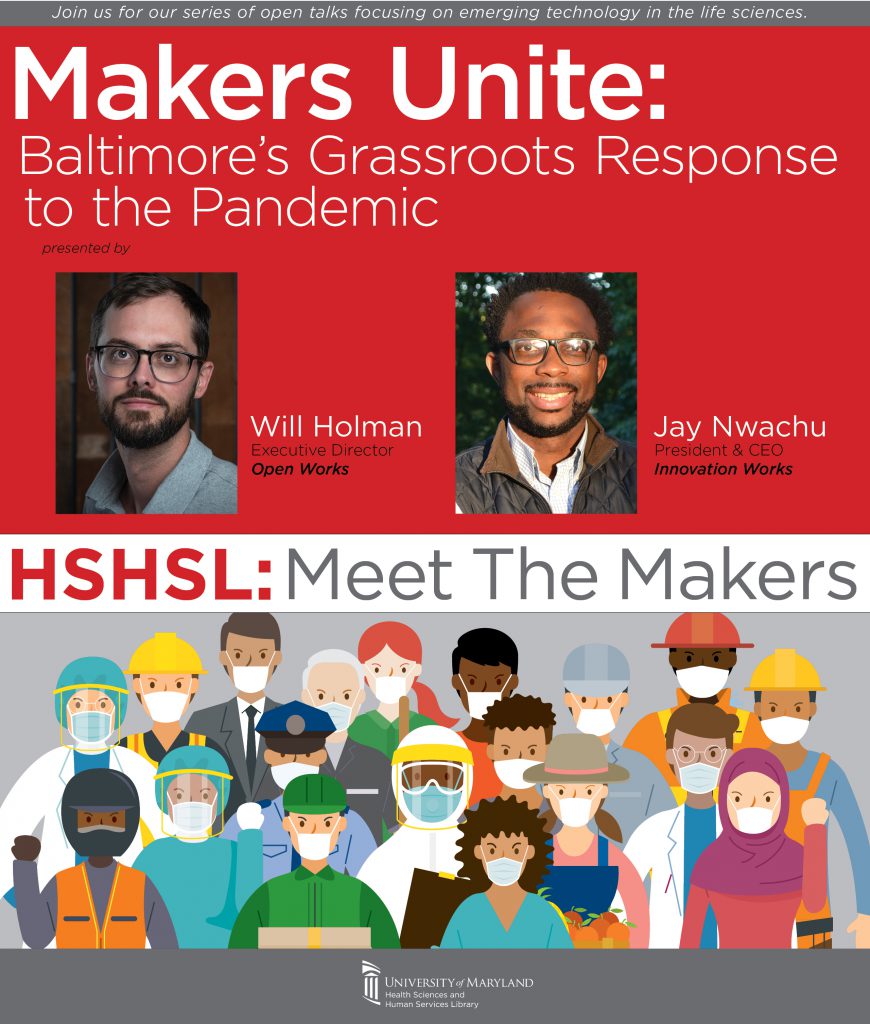
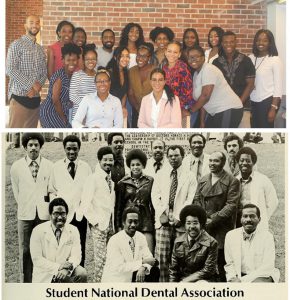 Student National Dental Association, School of Dentistry
Student National Dental Association, School of Dentistry 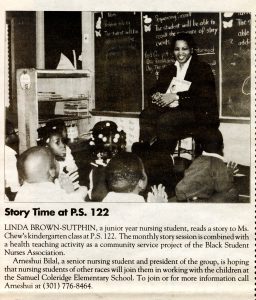 Black Student Nurses Association, School of Nursing
Black Student Nurses Association, School of Nursing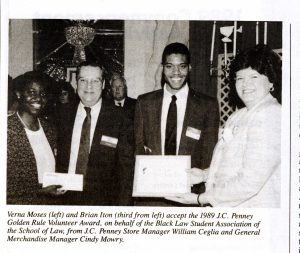
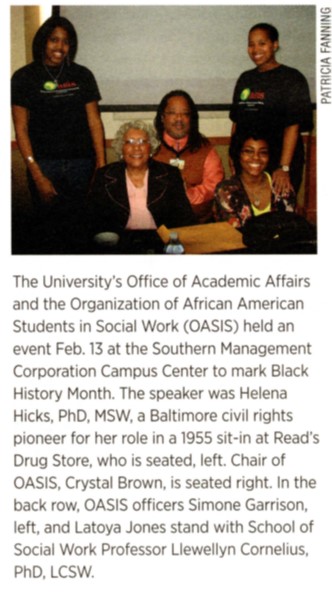 Organization of African-American Students in Social Work, School of Social Work
Organization of African-American Students in Social Work, School of Social Work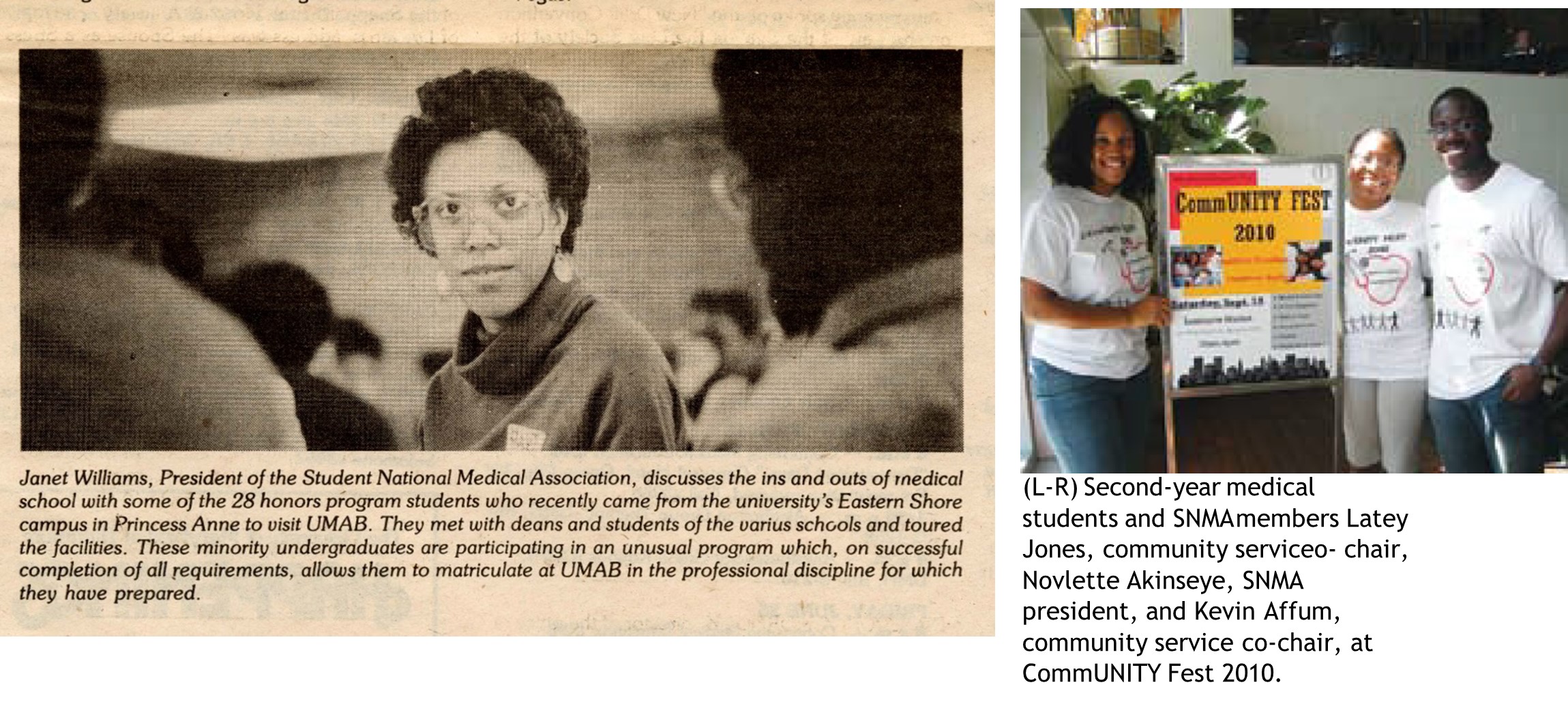 The Student National Medical Association (SNMA) was founded in 1964 by students from Howard University and Meharry Medical Schools. The organization has been on UMB’s campus for over 50 years. Its mission, according to the organization’s
The Student National Medical Association (SNMA) was founded in 1964 by students from Howard University and Meharry Medical Schools. The organization has been on UMB’s campus for over 50 years. Its mission, according to the organization’s 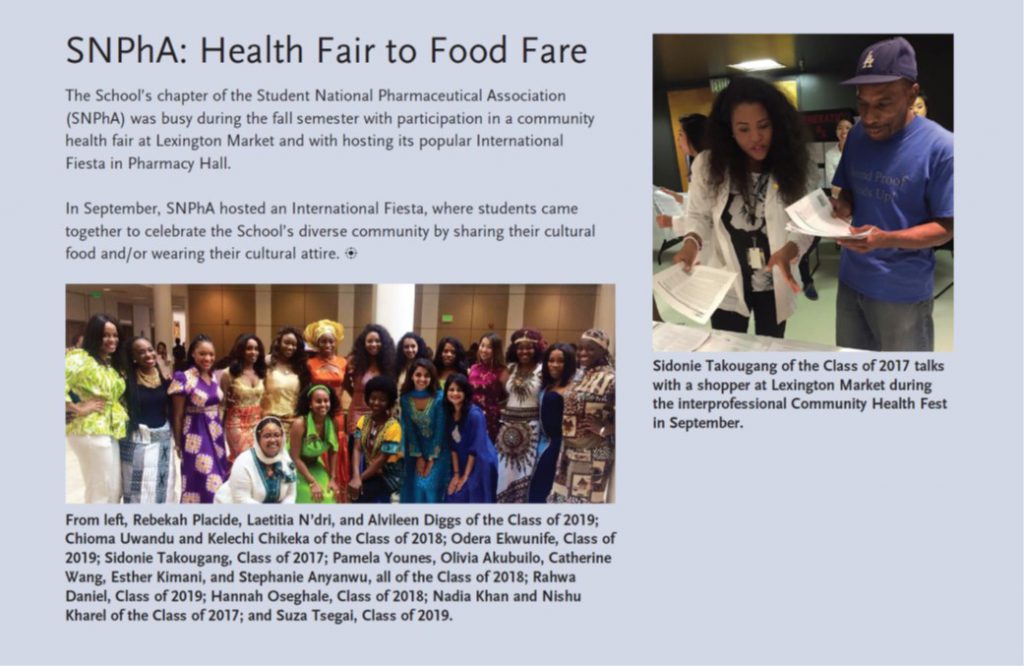 The national organization of the Student National Pharmaceutical Association (SNPhA) was founded in 1972 at Florida A&M University by Sharon Roquemore and John J. Scrivens. UMB’s chapter was established by Alex Taylor ’76, who served as its first president, and Clarence Jeffers III ’75. Taylor and Jeffers sought to eliminate the isolation felt on campus by minority students, help these students with academics, and educate the minority groups in the community about the pharmacy profession. (
The national organization of the Student National Pharmaceutical Association (SNPhA) was founded in 1972 at Florida A&M University by Sharon Roquemore and John J. Scrivens. UMB’s chapter was established by Alex Taylor ’76, who served as its first president, and Clarence Jeffers III ’75. Taylor and Jeffers sought to eliminate the isolation felt on campus by minority students, help these students with academics, and educate the minority groups in the community about the pharmacy profession. (